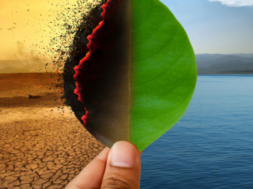
Climate: Warmer soils may cause climate change, says study
New Delhi: Climate scientists have said warmer soil can cause climate change.
Researchers at the UK’s Exeter University, who conducted research on the theme ‘Temperature effects on carbon storage are controlled by soil stabilization capacities’, drew this inference.
Published in the Nature Communications journal on Thursday, they studied the rapid deterioration of carbon storage in the top 50 cm of soils at increased average temperatures from over 9,000 global soil samples. Warm soil releases more carbon into the atmosphere, further speeding up global warming and the subsequent climate change, they said after studying different soil compositions to find out its impact on global warming and climate change.
However, carbon storage fell by over 25 percent across all soils with every 10 degree Celsius increase in average soil temperature.
College of Life and Environmental Sciences Professor, Iain P. Hartley said, “Since there is more carbon stored in soils than there is in the atmosphere and all the trees on the planet combined, releasing even a small percentage could have a significant impact on our climate.”
The study revealed that the amount of carbon released in the atmosphere varies from the soil textures, with low-clay or coarse-textured soils losing three times more carbon than clayey or fine-textured soils. It also depends on the heating capacity of each soil. Coarse-textured soil heats faster than clayey soil.
“Our analysis identified the carbon stores in coarse-textured soils at high-latitudes (far from the Equator) as likely the most vulnerable to climate change. Such stores, therefore, may require particular attention given the high rates of warming taking place in cooler regions. In contrast, we found carbon stores in fine-textured soils in tropical areas to be less vulnerable to climate warming,” he added.
Finer soils provide more mineral surface area for the carbon to plan bonds and reduce the tendency of microbes to access or decompose it, the study added.
(Avya Mathur)














